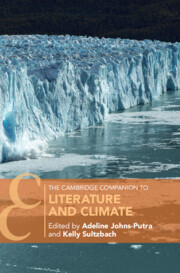Book contents
- The Cambridge Companion to Literature and Climate
- The Cambridge Companion to Literature and Climate
- Copyright page
- Contents
- Figures
- Notes on Contributors
- Introduction
- Part I Historical Shifts in Climate Consciousness
- Part II Current Issues in Climate Change Criticism
- Part III Ways of Telling Climate Stories
- Part IV Dialogic Perspectives on Emerging Questions
- Science Fiction and Future Fantasies
- Collective Climate Action
- Love Letters to the Planet
- Diverse Indigenous Voices on Climate
- Redefining ‘the Real’
- 19 Transtextual Realism for the Climatological Collective
- 20 Critical Climate Irrealism
- Selected Bibliography
- Index
- Cambridge Companions to …
20 - Critical Climate Irrealism
from Redefining ‘the Real’
Published online by Cambridge University Press: 31 March 2022
- The Cambridge Companion to Literature and Climate
- The Cambridge Companion to Literature and Climate
- Copyright page
- Contents
- Figures
- Notes on Contributors
- Introduction
- Part I Historical Shifts in Climate Consciousness
- Part II Current Issues in Climate Change Criticism
- Part III Ways of Telling Climate Stories
- Part IV Dialogic Perspectives on Emerging Questions
- Science Fiction and Future Fantasies
- Collective Climate Action
- Love Letters to the Planet
- Diverse Indigenous Voices on Climate
- Redefining ‘the Real’
- 19 Transtextual Realism for the Climatological Collective
- 20 Critical Climate Irrealism
- Selected Bibliography
- Index
- Cambridge Companions to …
Summary
Rather than dwelling on routinely marked distinctions between realist and science fictional modes, this chapter identifies an emergent strand of writing about climate change that it calls ‘critical climate irrealism’. It builds on Michael Löwy’s ‘critical irrealism’ where the irreal – as in the fantastic, oneiric, or surrealistic – erupts within a predominantly realist text. ‘Critical irrealism’ describes fictions that do not follow realism’s ‘accurate representations of life as it really is’ but that are nevertheless critical of social reality. Critical irrealism is a notable feature of what World Literary Studies calls literature emerging from the ‘periphery’: territories that suffer from the violent extraction of labour and resources by the ‘core’ of the capitalist world system. This chapter argues that a comparable, and sometimes intersecting, process can be seen in contemporary fiction that uses the weird, the Gothic, the uncanny, and other modes of irrealism to engage with climate change. But it also suggests that climate change’s non-local effects and distorted temporalities complicate the core/periphery model. In bringing together ‘critical irrealism’ with a sense of ‘climate crisis’, ‘critical climate irrealism’ describes an important new trend, where the irreal negotiates radical environmental upheaval in a manner that realism’s recognisable individual experience cannot.
Keywords
- Type
- Chapter
- Information
- The Cambridge Companion to Literature and Climate , pp. 296 - 306Publisher: Cambridge University PressPrint publication year: 2022
- 2
- Cited by

